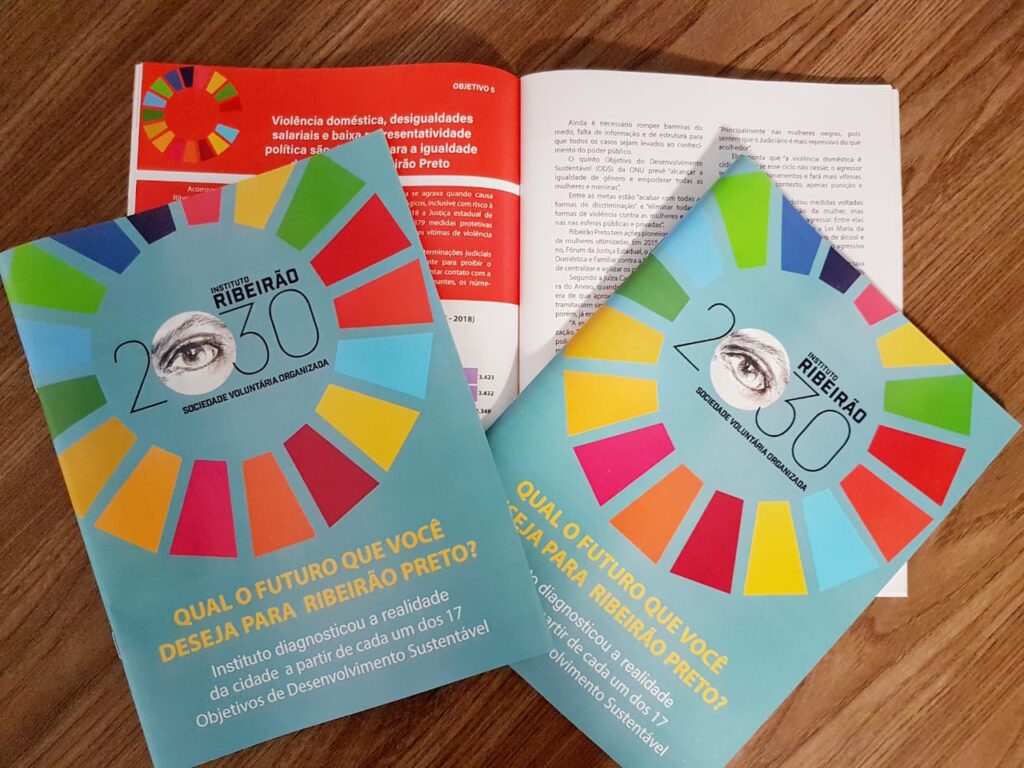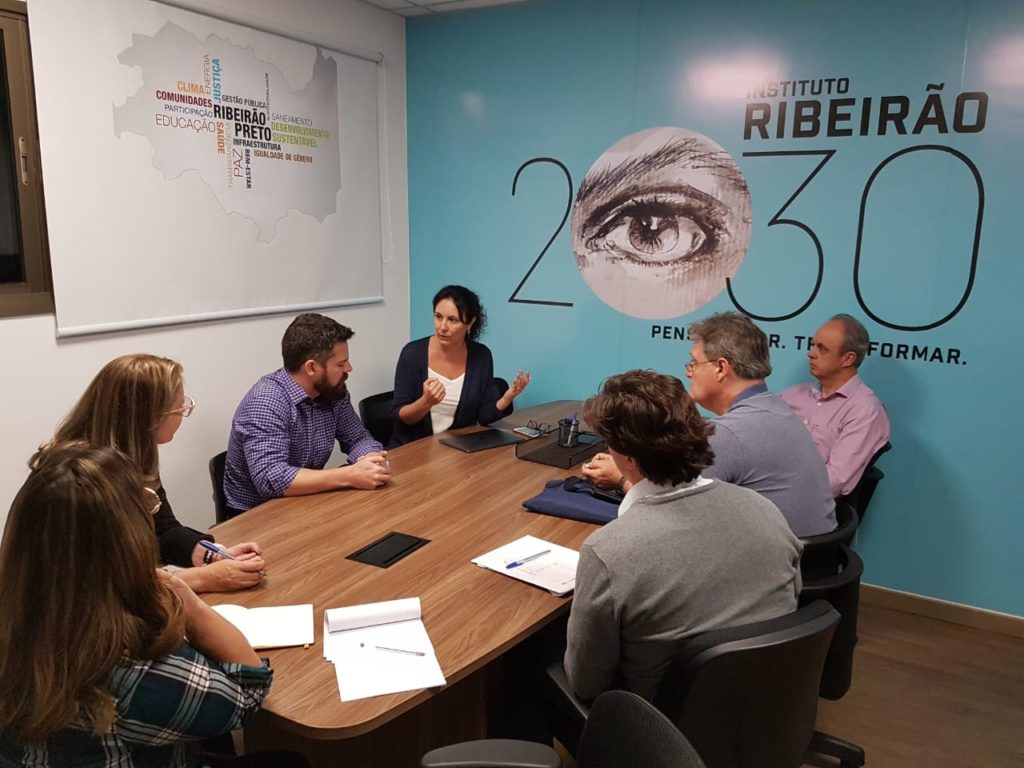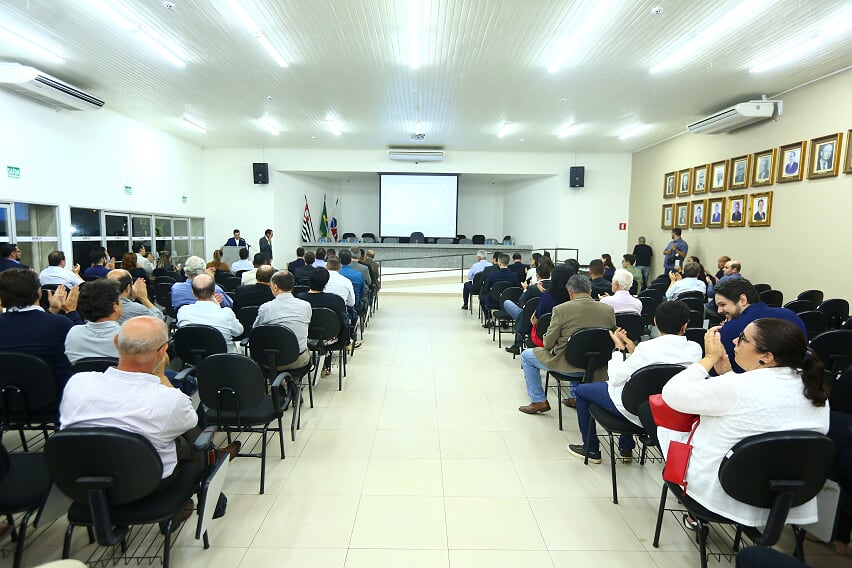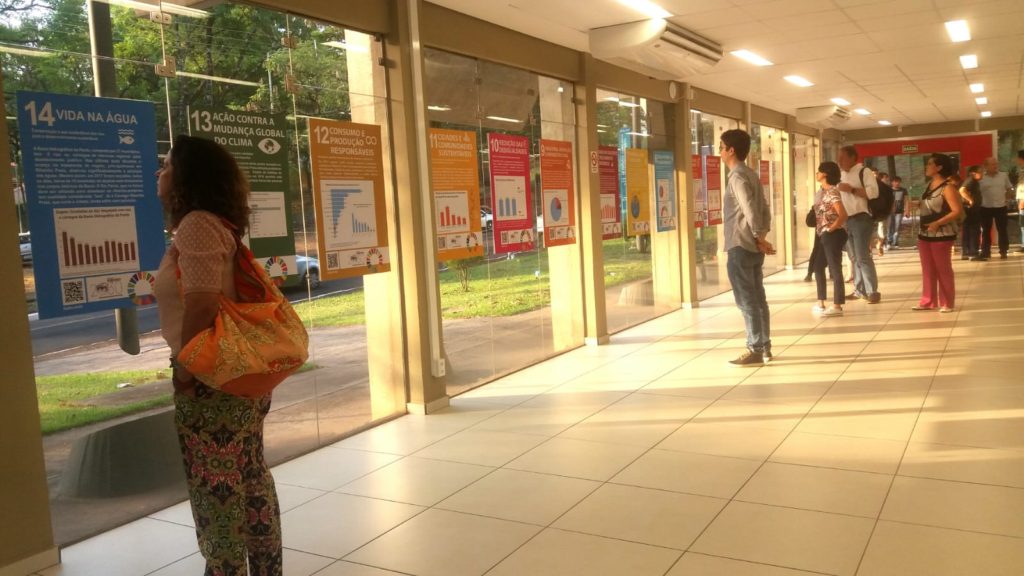The Ribeirão 2030 Institute is an organized civil society entity created in Ribeirão Preto City (located in the state of São Paulo) in April 2018 to support the city’s sustainable development initiatives. It was created with emphasis on the Sustainable Development Goals (SDGs) approved by the United Nations (UN) to be achieved by the year 2030.
In February 2019, the Ribeirão 2030 Insitute began a series of local surveys based on the SDGs in order to collect indicators, from and with the community, to draw up actions found on of the 2030 Agenda (https://www.ribeirao2030.com.br/ods-diagnosticos/). One of our main goals is to deliver by June 2020 a City Plan based on these diagnoses, so that future governments have a more serious commitment to follow and fulfill the City Plan’s programs. Thus, government along with community members will perceive Ribeirão Preto City in a more integral, humane and sustainable way.
We, the Ribeirão 2030 Institute, understand that for the world to enter a sustainable path, we must take urgent transformation measures. The 169 goals organized into the 17 Sustainable Development Goals have become the compass that drives our actions.

Times when we ponder about of these global goals and the challenges that our city faces, achieving these goals seem so out of our reach and impractical. However, we strongly believe that the will to change is within. So, how do we turn that feeling into effective actions? After taking the time to reflect on how to reduce this sense of distance between problems and solutions, we decided to make a local diagnosis of the city, based on the SDGs agenda.
Currently, our political and economic scenario are going through a very delicate moment, with plenty of challenges and urgent needs. At the time we started this project, to think of the city from the perspective of the SDGs, we discovered a serious challenge which is the lack of information. Data and records captured by the City Halls and City Secretaries’ Office were not always shown, and the few data and records shown were not easy to get access to.
At the beginning of this process, we not only sought for registration in files and documents, but we also conducted field researches following the 17 objectives. Being in the field gave us the opportunity to hear and see more clearly the issues we are facing as well as recognize the impact of our reality that very often cold numbers cannot displayed.
Listening to those who are silenced and who live daily with the consequences of this invisibility, made us understand that our starting point in this entire process of transformation and focus should be the human being.

By empowering human beings, their realities can be transformed. Thus, when we think about the application of the SDGs focused on our local reality, we think not only of Ribeirão Preto City, but in the entire world. Believing that small changes generate big transformations which is the force that drives us in this cause.
In this process, we understand that some goals are accelerators, that when applied, as consequence these accelerators achieve others goals. It is in these goals that Ribeirão 2030 works most incisively.
Among these accelerators objectives, we highlight the SDGs 4- Quality Education.
Respect for the human being in their individuality, respect for their choices and expressions is our foundation. Understanding the plurality of the human being, makes us exercise the muscle of true understanding, listening and empathy. When we understand that differences can build bridges rather than walls, we begin to look at the individual as he/she/they really is (are) the main agent of transformation of our reality. And how do we do that? It is always through education.
When we think of education, we speak not only of academics, but also of the education of the individual as a citizen, who must work on his/hers/their sense of responsibility and conscience in order to make good political choices. Moreover, we talk about culture and its multiple manifestations, which add history, generate belonging, teach criticism and the touch the human being through art. We speak of environmental education, where a citizen can see himself, herself, themselves as part of the whole that are inserted; Consequently, citizens cease to become just users of the city, but they become co-creator. We talk about educating in ways that empower young people and women to build financial independence and emotional intelligence. We talk about inclusive education, we understand that every individual must have educational spaces available to them, not only to the most privileged. When we talk about quality education, we talk about learning and teaching respect.
We understand that SDG 16 – Peace Justice and Strong Institutions and SDG 17 – Partnerships and Means of implementation, are the basis of all actions between civil society, private initiative and the public power. For this reason, transparency is an active part of our agenda among many other actions in assisting and monitoring social control in our city.
The agenda of transparency was initially what motivated the creation of the group, which later became the Ribeirão 2030 Institute. Ribeirão Preto City continues in a process of creating an economic, political and self-esteem reform. We came from a corruption scandal that shook beyond the coffers, destroying the spirit of belonging and trust in the public power. This generated a constant feeling of distrust and incredulity between the citizens and the Executive office, making what should go together more distant and inefficient.
After these events, a civil society organization composed of businessmen, teachers, students and several people from different areas came together to think about actions and solutions for the city. From this meeting the Ribeirão 2030 Institute was born, and transparency since its birth has become a priority in all our activities.
Another focus of the Ribeirão 2030 Insitute is sustainability. The following goals reflect our urgency to act and the importance of rethinking the human behavior towards the earth and the way its resources are used. Doing so, human actions do not lead us (ever faster) to extinction. These goals are: SDG 2 – Zero Hunger and Sustainable Agriculture; SDG 11- Sustainable Cities and Communities; SDG 12- Responsible Consumption and Production; SDG 13- Action against global climate change; SDG 14- Life Below Water and finally SDG 15- Earth Life.
Human beings need to be reconnect to the environment. It is needed more than simple awareness on the subject, but that the feeling of belonging and ownership must be reborn in each one. If so, our daily choices will be based on understanding resources and their scarcity, creativity and sustainability within the economy, innovation and preservation with the aid of technology and the possibility of living healthier and more harmonious on the planet.
It is critical to rethink the relationship between the countryside and the city, the functions performed by cities and their cultural identities, so that by understanding the context we are inserted (geographically, economically and culturally), then we will be able to act effectively and specifically within the reality of each municipality.
Creating actions for the municipalities that aim at a creative and sustainable economy, and propitiate this approach of individuals to the environment, is one of the essential objectives of Agenda 2030 and the Ribeirão 2030 Institute as well.
Below are some of our actions presented in sequence, based on Agenda 2030:
In September 2019, in order to discuss mechanisms of transparency and social control in Ribeirão Preto City, the Ribeirão 2030 Institute held the Municipal Transparency Forum. Following the guiding principles of SDG 16, which aims to “substantially reduce corruption and bribery in all its forms”, “develop effective, accountable and transparent institutions at all levels.” Lastly, “ensure responsive, inclusive, participatory and representative decision-making at all levels.”
With the support of 14 local entities, the event aimed to promote a purposeful debate, so that organized civil society can supervise and assist the government in measures that increase the efficiency of public spending as well as the prevention of irregularities.

Based on the SDG 16 goal, the award aimed to honor the historian and journalist Nicola Tornatore who is from Ribeirão Preto City and has worked in the local press for over three decades.
We, at the Ribeirao 2030 group, understand the importance of encouraging the production of investigative journalism, as it helps to consolidate an enlightened society, bringing light to the political events of the city.
Journalists and students will participate in the event, and the top three students will be awarded and be part of the debate that will take place at the Transparency Forum.
Still focusing in the goals set by SDG 16, the Ribeirão 2030 Institute, together with 14 other local entities created in the city the Transparency Committee.
In order to foster transparency and social control in the local Executive and Legislative, the committee will act as an independent entity in proposing public policies and discussions in addition to overseeing compliance with the laws dealing with the subject.
One of the objectives of this committee is to make possible in the municipality a Municipal Council of Transparency and Social Control, a collegiate, permanent and autonomous body, advisory, supervisory, purposive and deliberative.
Moreover, some of our foreseen actions are proposing the creation of an open Municipal Transparency and Data Plan, with defined short- and long-term goals and actions and holding forums for civil society debate and engagement.
The SDG 11- Sustainable Cities and Communities has as one of its goals “to strengthen efforts to protect and safeguard the world’s cultural and natural heritage”.
We understand the importance of fostering local culture; thus, we at the Ribeirão 2030 Institute created a Cultural Projects Bank to assist in fundraising. Through a Cultural Projects Bank, Ribeirão Preto City initiatives will be registered, which have already been approved in incentive laws, such as Proac (Cultural Action Program) and Rouanet.
This initiative seeks to create a “donation giving back culture” in the municipality, assisting cultural projects through tax incentives. The goal is to be a bridge between the project and potential supporters in the city.
Focusing on SDG 4, which proposes to ensure quality education for all, entities have signed an Education Pact for an Educating/Educated City Educator.
For a city to be an educator, rather than a success in education, it is necessary to prioritize human relations, inserting in the individual the feeling of belonging to the community.
The educating city interacts with the environment, protects and cares for its heritage, actively participates in community development, bringing education in its multidisciplinary far beyond the school walls.
The Pact for Education is a proposal for networking, where each individual involved will contribute strategically with his/hers/their skills, thinking about the collective and aiming at the transformation of education in Ribeirão Preto City.
In addition to the entities, the City Hall committed itself to the Pact, through the Secretariats of Culture, Education and the City Council.
The Ribeirão 2030 Institute leaders, together with the Municipal Secretariat of Education, agreed on the partnership model for the implementation of the Nota 10 Management Project in Ribeirão Preto City.
This project provides for short, medium and long term action plan, enabling managers and principals to diagnose potentialities and implement activities that positively impact student development as well as the school as a whole.

The Ribeirão 2030 Institute and partnership with IEA-USP held the exhibition: “Sustainable Development Goals (SDGs) in Ribeirão Preto City: Transforming our reality by 2030”.
At the IEA headquarters were installed 17 panels prepared by the Ribeirão 2030 Institute diagnosing the SDGs in the municipality. Along with the launch of the exhibition, there was also a discussion table with USP professors and Ribeirão 2030 Institute members.

During these almost two years of working towards transformation of our municipality, the Ribeirão 2030 Institute has been conducting various meetings and partnerships with civil society and representative entities, in order to encourage the municipality to live in a more humane way as well as to encourage more education.
In 2019, Ribeirão 2030 was present in higher education institutions such as Unaerp- University of Ribeirão Preto, Estácio and FAAP- Armando Alvares Penteado Foundation; and in cultural projects such as Projeto Guri, which is an education project aimed at the development of musical skills of children and adolescents during the school hours.
The Ribeirão 2030 Institute representatives have also made visits to companies around the Ribeirão Preto City presenting the diagnosis of the SDGs. We visited very influential companies in our city, such as JP Farma, Maubisa, Alliage, Campez Accounting and Habiarte. During these visits, we have the opportunity to listen to individuals representing these companies about their success and difficulties. Then, we make ourselves available to any question or help they might have or need when possible and appropriate in order to aim to transform our reality.
The Ribeirão 2030 Institute is a partner of the Paulista Institute of Creative Cities and Cultural Identities – IPCCIC, which is responsible for conducting research and actions in the cultural and creative urban management.
Cine Transforma is an initiative of the IPCCIC youth group. It’s main focus is to bring people closer together by creating meaningful discussions about the SDGs. At each session a documentary based in one of the SDGs is presented and, with the mediation of a guest speaker, a creative wheel is formed for a purposeful conversation on the subject.
Held once a month, Cine Transforma is open to anyone looking for an opportunity to break the routine and join people who believe that change is not just up to us, but it is up to us – united.
The Ribeirão 2030 Institute takes to these spaces lectures and workshops based on the 2030 Agenda, and reflecting of each SDG in the reality of our community with the aim of generating a sense of self-responsibility and belonging to the city as well as thinking together about solutions for transformation in us, and in the collective.
© 2021 Instituto Ribeirão 2030. Todos os direitos reservados | Desenvolvido por Inova House